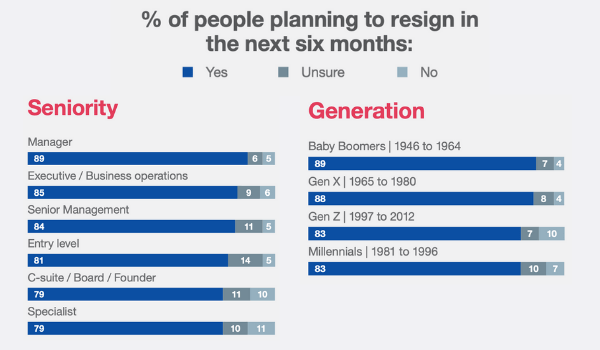It is estimated that around 86 per cent of professionals in India are planning to resign from their job in the next six months. The figure is highest among professionals in Asia Pacific and Japan. In countries such as Indonesia, Philippines, Malaysia and Thailand, the figure is above 80 per cent.
As per ranks and seniority, 89 per cent of managers, 84 per cent of senior management, and 81 per cent of entry-level employees want to call it quits in the next six months, says a Michael Page survey.
In terms of age group, Baby boomers and Gen Xers are more likely to switch than Millennials – 89 per cent Baby Boomers vs 88 per cent Gen Xers vs 83 per cent Millennials.
Among those who want to change jobs, around 61 per cent of respondents from India were willing to accept a lower salary or forego pay rise and/or promotion for better work-life balance, overall well-being and happiness.

There are multiple reasons for people to quit, and with so many people planning to quit, demand for talent is far outstripping supply, making human capital one of our scarcest resources.
Companies across are struggling to retain as well as attract talent, and there are several factors that contribute to it.
Career progression: About 48 per cent of respondents cited their search for career progression and promotion as the reason for quitting. Another 48 per cent of the respondents said they were keen to quit because they wanted a change in career, role and industry. Around 38 per cent were unhappy with their salary and 23 per cent were unhappy with the strategy and direction of the company.
Monetary factors: Financial gratification such as salary, rewards and bonuses continue to be a motivating factor, and 20 per cent of the respondents consider it to be an influencer for joining a new company or staying back.
Company culture: About 19 per cent of the respondents also lay emphasis on company culture and values, while 13 per cent of the respondents cite factors such as companies having a greater sense of purpose as being important.
Feeling of worth: Only six per cent respondents each emphasised on reasons such as promotion, flexible working arrangements, office location and technology. The survey reveals that employees want pay, bonuses, benefits and rewards, but more than ever, they want to feel valued and heard by their employers.
Right job: Of those unemployed, 43 per cent say they have been so for more than six months. The surge in resignations is being driven by people searching for the right job at the right company with the right values and culture — and many would simply rather remain unemployed until they have found the right match.
Work-life balance: The current workforce in India is also unhappy for several reasons. Around 88 per cent of the unhappy ones believe that their company does not take active measures to ensure work-life balance. About 65 per cent of the unhappy respondents also say that their company talks about the importance of work-life balance, but has not taken any action to deliver it.
While comparing their work life post and pre-COVID times, 57 per cent of people say that their workload has increased compared to the pre-pandemic times. Around 52 per cent say stress level has increased comparatively from pre-COVID times.
Meanwhile, Employees and job seekers are becoming more proactive in their personal learning processes, as 95 per cent of respondents believe that it is important for them to upskill themselves for their next career move and a majority of respondents also agree that they are responsible for their own reskilling and upskilling, rather than the onus falling on their employers.
The respondents also opine that education is no longer limited to often costly degrees or diplomas that take years to achieve. With the availability of online courses (certified and uncertified), employees can upskill themselves at their own pace and convenience, to future-proof their careers. About 74 per cent employees and 69 per cent employers believe an official programme or certification is required for proper upskilling and reskilling.
Michael Page did not reveal the number of respondents interviewed for this survey.



